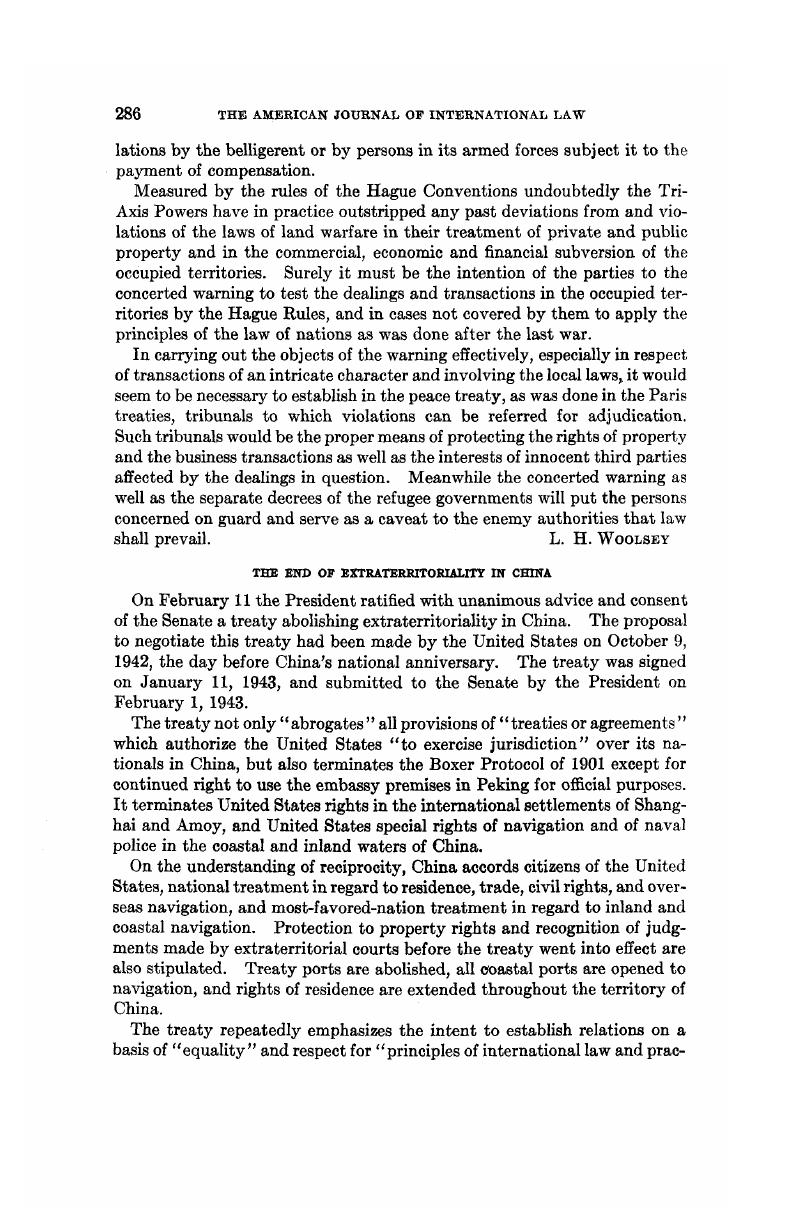Article contents
The End of Extraterritoriality in China
Published online by Cambridge University Press: 12 April 2017
Abstract

- Type
- Editorial Comment
- Information
- Copyright
- Copyright © American Society of International Law 1943
References
1 Preamble, Arts. 1, 6, 7, and supplementary exchange of notes. This Journal, Supp., pp. 65, 66, 68, 69.
2 Wright, Q., Legal Problems in the Far Eastern Conflict, Institute of Pacific Relations, New York, 1941, pp. 51, 109, 124Google Scholar.
3 Bulletin of International News, Royal Institute of International Affairs, Jan. 23, 1943, Vol. 20, p. 49.
4 Miller, Hunter, editor, Treaties and Other International Acts of the United States of America, Government Printing Office, Washington, 1934, Vol. IV, pp. 661–62.Google Scholar
5 Department of State Bulletin, Oct. 10, 1942, Vol. 7, pp. 805–8.
6 Ibid., Feb. 6, 1943, p. 134.
7 Wright, Q., “Some Legal Consequences if Extraterritoriality is Abolished in China,” this Journal, Vol. 24 (1930), p. 217 ff.Google Scholar
8 Mixed courts continue until 1949 under the Montreux convention of 1937. See Hackworth, Green H., Digest of International Law, Washington, 1941, Vol. 2, p. 516.Google Scholar
9 Treaty with United States, 1894, in force 1899, Arts. 18, 19.
10 Treaty with United States, 1920, in force 1921, Art. 16 and Annex 1; and 1937 in force 1938, Arts. 4,18.
11 Treaty with Great Britain, 1922, Art. 9, and judicial agreements, 1924, 1931; League of Nations Mandate, 1924; treaty with United States, in force 1931, Arts. 1, 2. See Hackworth, op. dt., Vol. 2, p. 526.
12 Treaty of Lausanne, 1923, in force 1924, Art. 28, and treaty with United States, 1931, in force 1933. The Turkish declaration in 1914 unilaterally abrogating extraterritorial rights was held to be without legal effect. Hackworth, op. cit., Vol. 2, p. 529.
13 Notice terminating treaty of 1856 with United States and treaties with other countries, 1927, in force 1928.
14 Treaty with Great Britain, 1936, and with other countries in Montreux Convention of 1937.
15 Mixed courte continue in Tangier, Morocco. The United States has not recognized the termination of extraterritoriality in the French or Spanish zones of Morocco or in Muscat, though other countries have. (Hackworth, op. cit., Vol. 2, pp. 504–9, 530.) Claims to extraterritorial jurisdiction in Palestine and Syria were suspended by establishment of the mandates. (Ibid., pp. 517, 524.) The United States and other countries have relinquished extraterritoriality in Korea, Zanzibar, Tripoli, and Tunis. (Ibid., p. 534, and United States treaty with France, 1904.)
16 Wright, Q.. Legal Problems in the Far Eastern Conflict, pp. 19–25. 124Google Scholar.
- 5
- Cited by


